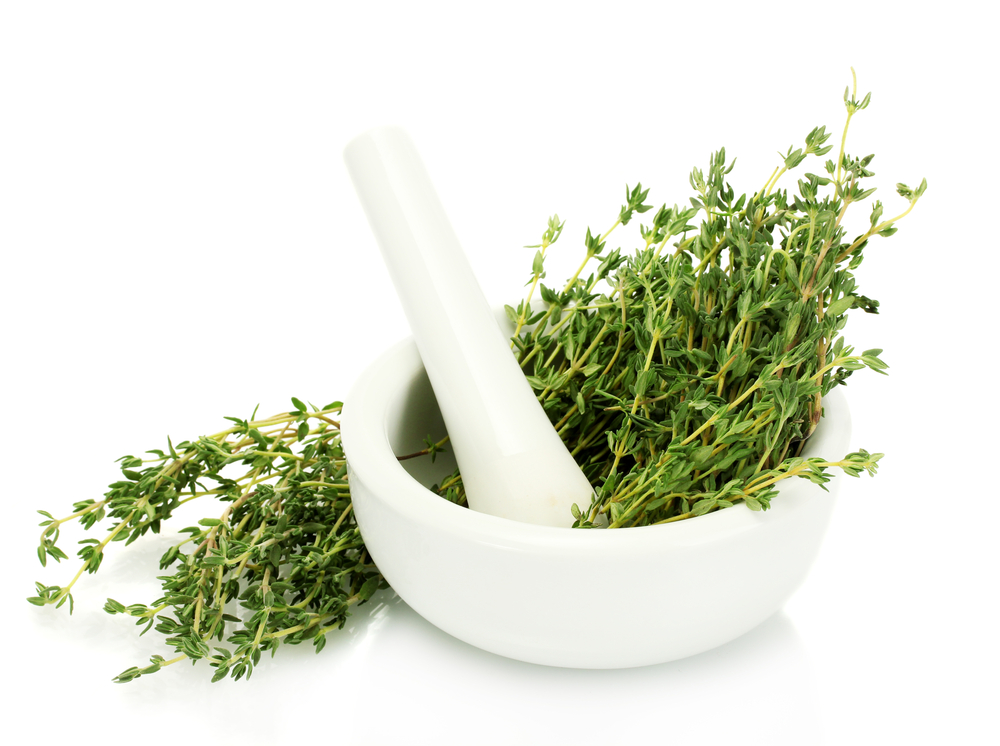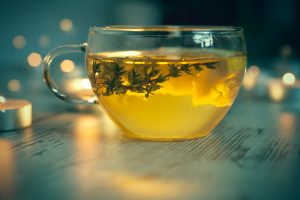
By: Catherine Ebeling
Co-author of the best-sellers: The Fat Burning Kitchen, The Top 101 Foods that Fight Aging & The Diabetes Fix
You probably have this herb in your kitchen cabinet right now. It works well in salad dressings, sauces, stews, soups and tea. Right?
It’s a staple in many Mediterranean dishes as well and has been used for years as both an ingredient for food, a food preservative and a medicine. Whether fresh or dried, thyme is a staple in French cooking as the herb combination bouquet garni, used in stock, stews, soups and roasts. Most all savory dishes taste even better with a bit of thyme.
The ancient Egyptians used thyme as an embalming oil. Hippocrates recommended thyme for respiratory diseases or coughing. Back in the Roman days, it was used as a way to stop the effects of poisoning and even afterwards, it was used as a bathing ingredient to suck toxins out of the body. It was used as a cure for melancholy or shyness as well. Thyme actually has been used as an effective antibiotic as well. When the Plague swept across Europe, people wore posies of thyme as a source of protection.
Thyme is an ingredient that has been used in modern-day medicinal uses as well. Listerine uses the active ingredient, thymol from thyme as an antibacterial, and Vicks Vaporub also utilizes thyme. Thyme’s active ingredient is actually used frequently today by many pharmaceutical companies in medications.
Does this sound familiar? Like many of the spices and herbs in your cabinet, these often- overlooked herbs have some very powerful benefits. Thyme is one of those.
Thyme and its essential oil are used in diffusers to kill air-borne bacteria, ointments to fight infection from cuts and scrapes, mouth washes to kill bad breath, throat gargles to stop sore throats, and to soothe a cough. It is also an effective expectorant and works well for bronchitis and sinus infections.
Thyme contains a variety of what is called volatile oils, which are the active ingredients in thyme. These include carvaclol, borneol, geraniol and best-known thymol, with its powerful antiseptic and antibacterial action. It has actually been proven to kill some of the strongest (and often antibiotic-resistant bacteria such as Staph aureus, E.coli, and Shigella sonnei.)
- Sore Throat and Cough Fighter — During the cold & flu season, or ANY time of year, thyme can help kill viruses and bacteria and aid your immune system. Thyme’s ingredients are antimicrobial, meaning it is effective against viruses, bacteria, and other pathogens. A recent study conducted at a University in Poland tested thyme against 120 different strains of bacteria, with patients who had infections the mouth, respiratory tract, and urinary tract. Thyme actually boosts the power of a popular antibiotic, erythromycin. The study showed thyme as being extremely effective against all the bacteria, including some of the antibiotic resistant ones.
 Thyme has been used for hundreds of years as a treatment for coughs and bronchitis. This study from Germany used thyme as an oral treatment for coughing. The group treated with this combination had a 50% reduction in coughing fits. Add this lovely herb to your soup or tea, and enjoy not only its taste, but germ-killing power too. Thyme is also a powerful immunity-booster as well.
Thyme has been used for hundreds of years as a treatment for coughs and bronchitis. This study from Germany used thyme as an oral treatment for coughing. The group treated with this combination had a 50% reduction in coughing fits. Add this lovely herb to your soup or tea, and enjoy not only its taste, but germ-killing power too. Thyme is also a powerful immunity-booster as well.
- Protects Against Food-borne Illness — Using thyme as an ingredient in food actually helps to preserve it and protect against some of the dangerous bacteria that can cause food poisoning. This study showed that thyme and thyme oil were natural preservatives against several common types of food-borne bacteria including Listeria monocytogenes, Clostridium perfringens, Bacillus cereus, Staphylococcus aureus, Enterococcus faecium, Enterococcus faecalis, and Staphylococcus epidermidis. Washing your produce with a solution that contains just 1% of thyme oil will kill the bacteria that often causes many food-borne illnesses.
- Clear Healthy Skin—Thyme is very effective against bacteria on the skin that can cause acne. Scientists from the U.K., tested the effects of thyme tinctures on acne and found that the antibacterial effect proved stronger than the standard acne concentrations of benzoyl peroxide, the active ingredient used in most creams and washes that are recommended for acne. Thyme was also found to be very effective in treating skin fungus like athlete’s foot, yeast infections, and even eczema.
- Help for High Blood Pressure and Cholesterol—Thyme is excellent as a way to lower blood pressure without medications and their side effects. This study showed a significant decrease in blood pressure readings. The extract of thyme also helps to reduce triglycerides and LDL cholesterol, AND help to increase the beneficial HDL cholesterol. And thyme also helps to reduce inflammation, another factor in heart disease. It is thought that one of the reasons the Mediterranean diet is so healthy is because of their generous use of herbs like thyme and oregano.
- Mood Boosting Benefits—Thyme contains an active ingredient called carvacrol, which produces some great mood-boosting benefits. Research published in 2013 showed that it helps to increase both serotonin and dopamine in the brain. Both of these are ‘feel-good’ brain chemicals and vital for good moods. So as thyme is regularly eaten in foods, it may actually just put you in a much better mood!
Thyme has been used frequently in many recipes, especially savory soups, stews, and roasts. It is usually available either dried or fresh and is delicious as a tea as well. I love adding thyme to chicken, fish, or veggie dishes. I especially love fresh thyme in salad dressings like this one in this Wine Country Chicken and Asparagus Salad. The options to use thyme are really endless. You can add it to just about any dish you like for its added health benefits.
Thyme has been used for centuries as a medicine and a cure all, but our friend, Dr. Joshua Levitt, ND wants to share some important information about inflammation with you.
6 Anti-Inflammatory Foods For Your Knee, Hip & Back Pain
As a naturopathic physician, for the better part of the last 20 years my main job has been to keep my patients’ joints moving freely…
Or to free them up when they’re stuck.
Today, I’m going to share with you what I’ve learned over all these years…
And let you in on a “trade secret” that will help your joints feel like they just got an oil change.
Read Now: 6 Anti-Inflammatory Foods for Your Knees, Hips, and Back
 thenutritionwatchdog.com What's in your food? Discover which "healthy" foods are harming your health and which foods protect your body
thenutritionwatchdog.com What's in your food? Discover which "healthy" foods are harming your health and which foods protect your body 
Thank you so much for your articles. We have been using oils for more than 10 years and are probably 95% alternative meds.I run from angry to amused at the people who call them “snakeoil”, as we have proved over and over that they work. Appreciate all the everyday hints in your articles, for different ways of using them.
To help control hypertension & cholesterol, how would one use thyme…as a supplemental capsule or topically?…and how much? I’m really tired of the side effects of both my BP & statin meds!
U same with my condition s. High BP 3 different meds diabetes kidney issues etc how to I take thyme to get max benifits
how much thyme should be used daily? What form does it come in?
I see others had same question of how much + route. Great info but if no details of how to use, it is next to worthless!
SEEK AND YE SHALL FIND… THERE’S A WORLD OF INFO ON THE WEB !!!
yes what kind and how much
I have used thyme as a remedy for flu for many years and it works wonders. I usually put 2teaspoons in a liter of hot water and drink it slowly throughout the day. I can drink up to 2 liters in a day. In two days I am good to go .
I have high blood pressure and cholesterol somewhat high or borderline. So what is the best way to use they thyme for drinking as a tea? I don”t like the pills. which is more beneficail the ones in a bottle from the store or the fresh one that has the long stem? Also how much should I use to lower my blood pressure? It’s great to know that it helps with inflamation because I have arthritus.
Thank you for the information.
Thank you for this wonderful information on Thyme. I have a chronic lung disease which antibiotics could not remove over 27 years. I have a small thyme plant and will make use of it and buy the extract. Happy Easter blessings,. Jean ??